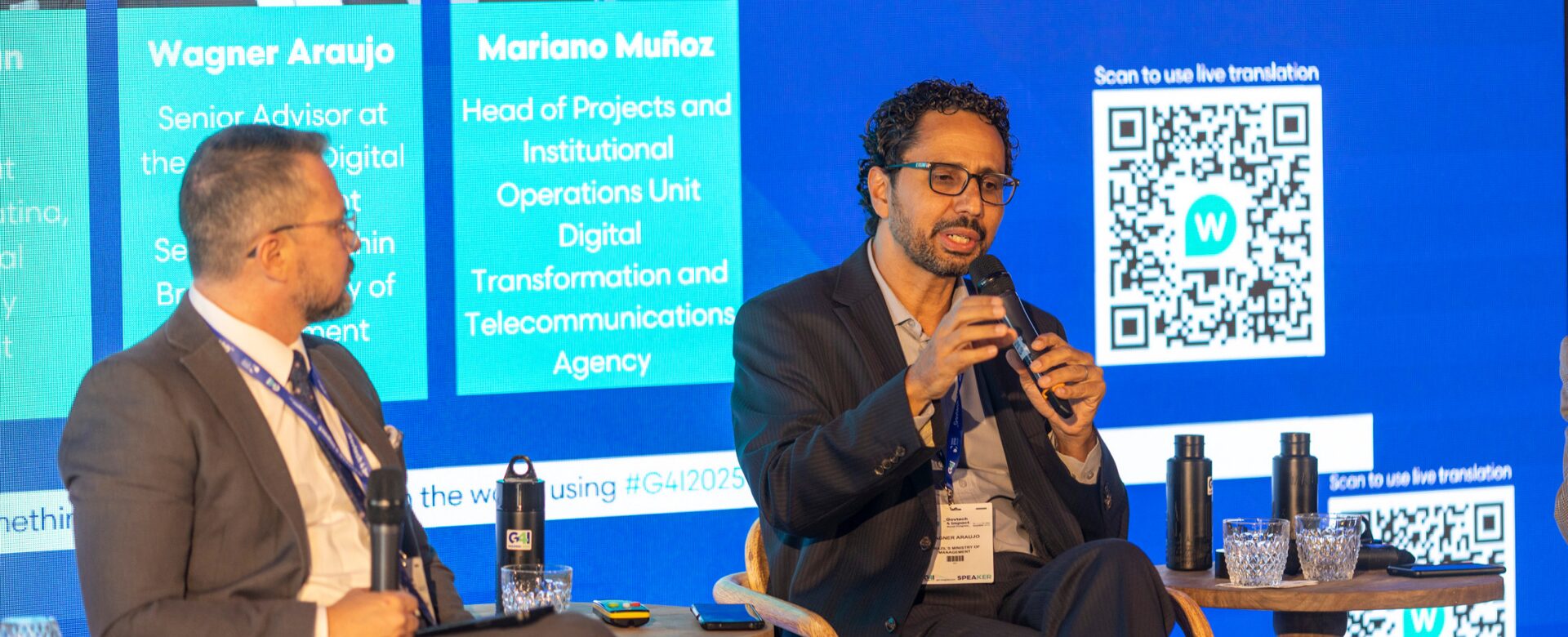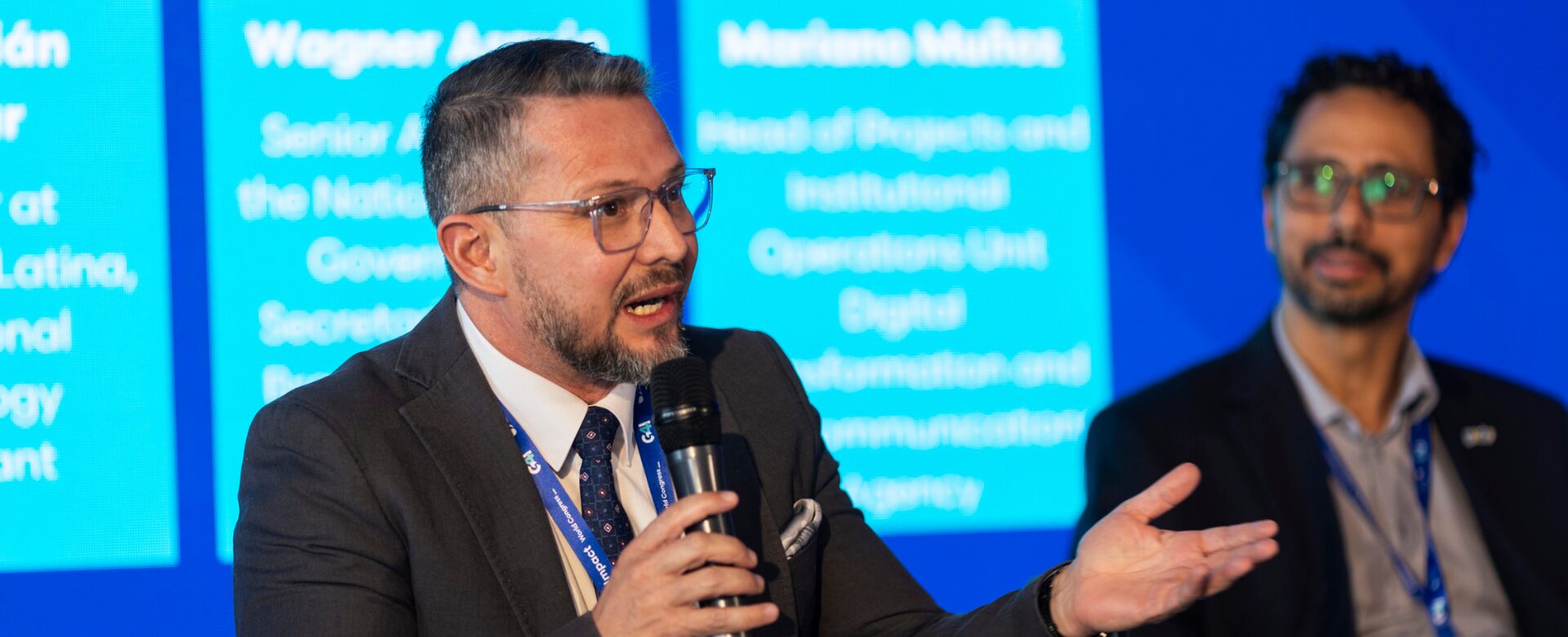GovTech in Latin America:
Success Stories and
Lessons Learned
Luis Adrián Salazar,
Wagner Araujo,
and Mariano Muñoz
GovTech in Latin America: Success Stories and Lessons Learned
Latin America is undergoing a remarkable transformation as governments across the region increasingly turn to technology to enhance public services. The surge in GovTech innovations has been largely driven by startups and local governments, which are embracing digital solutions to create more efficient and citizen-focused services. At the GovTech 2025 World Congress, experts from across the region gathered to share their experiences and insights on the challenges and successes of GovTech in Latin America. The session featured a dynamic panel with Luis Adrián Salazar, former Minister of Science, Technology, and Telecommunications of Costa Rica; Wagner Araujo, Senior Advisor at Brazil‘s National Digital Government Secretariat; and Mariano Muñoz, Head of the Projects and Institutional Operations Unit at the Digital Transformation and Telecommunications Agency.

The Rise of GovTech in Latin America
The conversation kicked off with an exploration of the rapid growth of GovTech in Latin America, with a particular focus on how different countries in the region are integrating technology into public services. While the region still faces challenges in terms of digital adoption, governments in Mexico, Brazil, and Costa Rica have made significant strides in transforming their public sectors.
In Mexico, Mariano Muñoz shared the journey of the Digital Transformation and Telecommunications Agency, a key institution dedicated to digitizing public services. This agency has made notable progress in simplifying government services through initiatives like Llave MX, a digital identity system that streamlines interactions between citizens and various government departments. By offering a unified digital identity, Mexico aims to simplify processes and ensure that government services are more accessible and secure for all citizens, regardless of their location.
In Brazil, Wagner Araujo discussed the country’s efforts to create a seamless digital government experience for its vast population. With over 210 million citizens and nearly 190 million internet users, Brazil is working to digitalize a vast number of services. The country is particularly focused on the Digital ID system, which offers biometric identification for citizens and aims to make access to government services more efficient. Araujo emphasized that this initiative is not only about streamlining processes but also ensuring that services are secure and accessible to all Brazilians, regardless of their social or economic status.

From Costa Rica, Luis Adrián Salazar highlighted the country’s long-standing commitment to digital transformation. Costa Rica’s approach to innovation has been built on a foundation of strong public-private partnerships and an emphasis on data protection, interoperability, and the creation of legal frameworks that support the digital economy. He pointed out that while Costa Rica has made significant progress, there is still much to be done to ensure that digital government services are inclusive and accessible to all citizens, particularly in rural areas.
Challenges and Solutions in Digital Transformation
The panelists also discussed the significant challenges they encountered in their respective countries and how they worked to overcome them. A major theme in the discussion was the political and organizational hurdles faced when trying to implement long-term digital initiatives. For many governments in Latin America, political instability and frequent changes in leadership can make it difficult to maintain momentum in GovTech projects.
Salazar, drawing from his experience as a former government official in Costa Rica, emphasized the importance of having political stability and long-term strategic planning to ensure the success of digital initiatives. Without clear and sustained commitment from leadership, many projects risk stalling or losing direction. The ability to maintain continuity in digital projects despite changes in leadership was a key lesson learned throughout the panel.
Another challenge discussed was the issue of interoperability between different government departments and public services. Mariano Muñoz and Wagner Araujo both stressed the need for a cohesive digital infrastructure that ensures seamless interactions between various government agencies. In Brazil, the Digital ID system plays a key role in overcoming this challenge by providing citizens with a single, unified identity that can be used across all public services. This not only streamlines processes but also reduces duplication and ensures a more consistent experience for citizens.

Talent development was another critical point raised during the session. As governments across the region look to digitalize services, there is a growing need for skilled professionals in fields such as software development, cybersecurity, and data analysis. The panelists discussed their efforts to build homegrown talent through training programs, internships, and partnerships with local universities. Both Brazil and Mexico have made strides in creating programs that train young professionals in digital skills and place them in government roles to help implement and maintain digital services.
The Importance of Public-Private Collaboration
Public-private partnerships were a recurring theme throughout the discussion. The panelists agreed that collaboration between government entities and private tech companies is essential to the success of GovTech initiatives. In Mexico, for example, the government has partnered with startups and tech companies to develop innovative software solutions for public services. This collaboration allows the government to leverage the expertise of the private sector while ensuring that digital solutions are scalable and sustainable.
Luis Adrián Salazar emphasized the role of the private sector in sustaining GovTech projects across political cycles. He pointed out that while government initiatives often face political challenges and changes, private companies provide the necessary technical expertise and financial backing to keep projects moving forward. Public-private partnerships also help ensure that digital solutions are not just theoretical but are implemented and refined based on real-world needs.

Key Lessons and Takeaways for Latin America
The panelists concluded the session by sharing some key lessons learned from their experiences in GovTech, offering practical insights for others in the region who are working to implement similar initiatives.
- Start Small and Scale Up: Mariano Muñoz emphasized the importance of piloting small-scale projects before scaling up. By testing new solutions on a smaller scale, governments can identify potential issues early and refine their approaches before rolling them out more widely.
- Foster Cross-Sector Collaboration: All three panelists agreed that collaboration between government, the private sector, and civil society is essential to the success of GovTech projects. When these sectors work together, they create an ecosystem of innovation that benefits both citizens and governments.
- Political Will and Strategy are Critical: As highlighted by Luis Adrián Salazar, having strong political will and a clear, long-term strategy is essential for the success of digital transformation. Governments must treat technology as a core part of their mission and ensure that it receives the necessary resources and support.
- Invest in Talent: The need for skilled workers in digital fields is paramount. Governments in Latin America must invest in education and training programs to ensure that the next generation of workers is equipped to handle the challenges of a digital future.
In summary, the GovTech session in Latin America highlighted that while the region is making tremendous strides in digitalizing public services, there is still much work to be done. The future of GovTech in Latin America depends on the continued collaboration between governments, the private sector, and civil society, as well as the commitment to talent development, political stability, and inclusive digital strategies.
